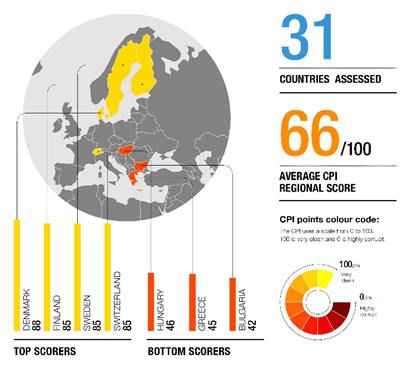13 January 2020
roadmap
austria
cee overview - compliance & criminal defence / corporate investigations & crisis management
The fight against corruption and white collar crime in CEE is intensifying
At the beginning of 2019, Transparency International painted a bleak picture of anticorruption efforts in Central and Eastern Europe.
On the Corruption Perceptions Index ("CPI"), Bulgaria scored 42, below the global average of 43. Bulgaria is followed by Greece (45), which dropped three points since 2017, and Hungary (46), which dropped eight points over the last five years.
Hungary has seen a significant decline in CPI scores in recent years, as a consequence of corruption believed to have worsened. Amongst others, Hungary faces allegations of a misuse of EU funds, which are not being investigated. Bulgaria has seen a serious corruption scandal, and Romania has witnessed significant anticorruption protests over a decree that would have protected many officials from corruption charges.
All these countries are also accused of not enforcing anticorruption laws effectively and of widespread impunity. In addition, at the beginning of 2019 both Romania and Bulgaria were still being observed by the EU's Cooperation Verification Mechanism (CVM), which monitors whether both countries are meeting the anticorruption and judicial reform commitments they made when they became EU members. They were accused of making little progress on judicial reforms and anticorruption efforts.
At the same time, the four countries are also examples that things can change for the better and that such change can come quickly:
- At the end of October1, the EU Commission reported that it believes Bulgaria has made enough progress in the fight against corruption and organised crime to leave the programme. Romania, on the other hand, has regressed in the fight against corruption and the monitoring should continue.
- Looking at developments in Romania, it seems only a matter of time until it will be released as well. As we will report in a separate chapter, the fight against corruption has picked up and the old government, which was largely blamed for sluggish enforcement and the corruptness of politicians, has bene toppled.
- There is also positive news from Hungary on the anticorruption front, as the recent investigation into Microsoft Hungary led by the DOJ (the Hungarian angle was settled for USD 8.7 million) has triggered a new investigation by the Central Prosecutor's Office (CPO) into corruption and fraud involving the local Microsoft subsidiary. The CPO has asked the DOJ to share all relevant information in order to start a new investigation.
Looking ahead, this development means two things: International companies have often complained that corruption in these countries poses a serious problem and increases the risk of doing business there. The mentioned developments should gradually improve the prospect of doing business in CEE. On the flipside, the increased anticorruption efforts also mean that companies can more easily be subject to investigations. When prosecutors start looking into corruption in tenders, all participants might have to ask questions. For international companies and their in-house teams, this will mean having to respond more frequently to investigations, so preparation will be needed.
1https://europa.eu/rapid/press-release_IP-19-6136_en.htm

